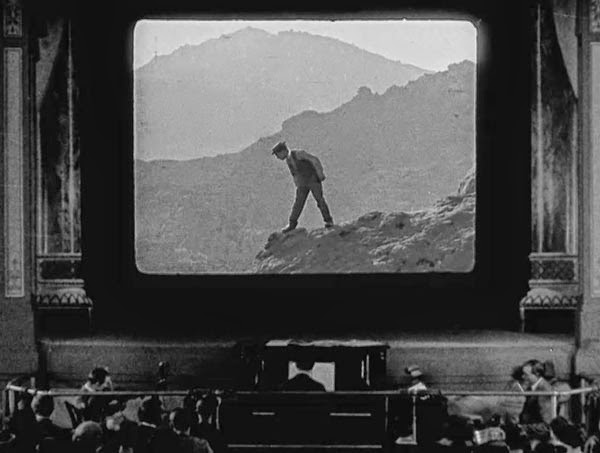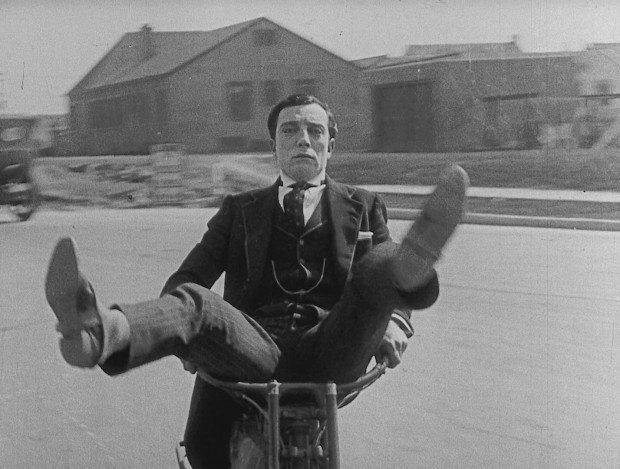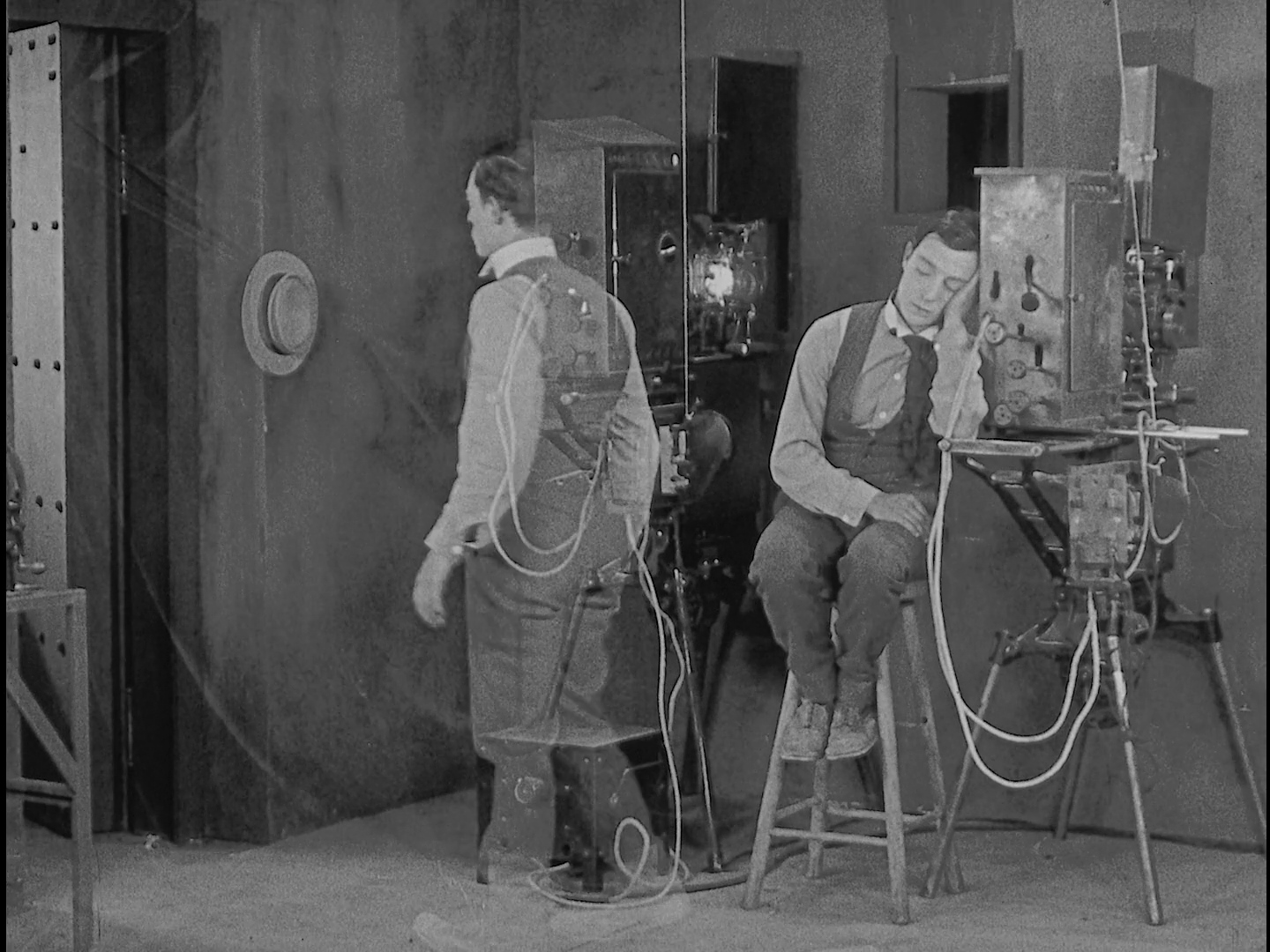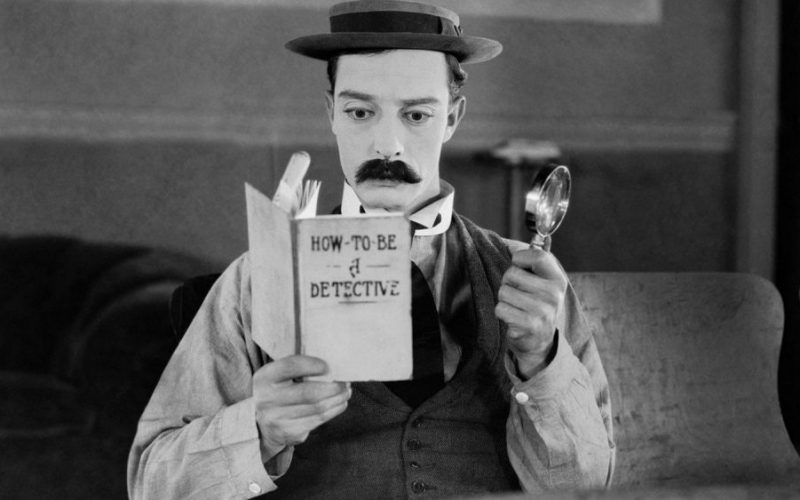Masters of Cinema Buster Keaton Collection: Part 1 – Sherlock Jnr. (1924) – Review.
How long should a film be? That’s a question that often gets asked these days, usually in relation to the potential impact at the box office. The longer the film the less showings per cinema, per day are available. This makes sense as films are commercial enterprises that cost a lot of money and need to make a profit to continue being a viable enterprise. This is also why so many Director’s Cuts are released on DVD and Blu-Ray – longer versions that the fans can enjoy but won’t eat up valuable theater time.
This question is usually focused on the upper end of the duration scale – films over two hours, but how about the other end of the scale? How short can a film be and still be classed as a feature film?
The reason I ask this question is because those fabulous people at Eureka Video have just released a new Blu-Ray box-set of three incredibly important feature films. The first of these is the 1924 classic Sherlock Jnr. which clocks in at only 45 minutes.
 But what a 45 mins! The story is wonderfully simple yet very clever in its execution. Keaton plays a cleaner and projectionist at a cinema who dreams of getting his girl and becoming a detective. One day whilst trying to woo his girl, he is framed by his love rival who also happens to be a local criminal for the theft of a watch owned by his intended’s father. Spurned by his girl he returns to work in the projection booth, falls asleep and has one of the funniest dreams ever put to film.
But what a 45 mins! The story is wonderfully simple yet very clever in its execution. Keaton plays a cleaner and projectionist at a cinema who dreams of getting his girl and becoming a detective. One day whilst trying to woo his girl, he is framed by his love rival who also happens to be a local criminal for the theft of a watch owned by his intended’s father. Spurned by his girl he returns to work in the projection booth, falls asleep and has one of the funniest dreams ever put to film.
Firstly his dream-state self rises from his body then runs down the cinema aisle and jumps into the film that’s being shown on the screen. A lot of people recently would have witnessed the scene towards the start of Thor: Raganok when Thor and Loki are toyed with by Doctor Strange – the scenes changing around them as they walk from cut to cut getting more and more confused. This scene has its roots in this extraordinary few minutes in Sherlock Jnr. Keaton jumps off a rock into the sea only for the scene to change and he falls head first into snow. He walks along a busy city street for the scene to change and he almost falls off the edge of a cliff. Each transition puts our hero in increasingly odd scenes, each cut getting funnier as it goes on.

This is virtuoso filmmaking, a craftsman in full control of this craft, a filmmaker who understands the language of film and is confident enough to play with the audience by way of the clever use of his skills as a filmmaker. People often talk about the impact D.W. Griffith had with his controversial yet seminal film The Birth Of A Nation yet Sherlock Jnr. was made only 9 years later and already this new language was being subverted and toyed with. Whist Russian masters like Eisenstein, Pudovkin and Kuleshov were experimenting with the thematic possibilities of montage, Keaton was doing the same with the comedic possibilities.
The rest of the film has all the things you would expect from Keaton. There are some brilliant and very dangerous stunts including Keaton riding on the handle bars of a motorbike after the rider has fallen off, a brilliant jump off the top of a building and into the back of a moving car by using a very large lever barrier and, most dangerous of all, a sprint across the top of a moving train then lowing himself to the ground using the gushing spout of a Water Stop. The water came out much faster and harder than anticipated causing Keaton to be slammed to the ground. He blacked out and production had to be halted for the rest of the day and he suffered from extreme headaches and pain for a number of weeks afterwards.

There are also many innovative stunts, for example in one scene Keaton seems to jump into a suitcase held by a man dressed as an old woman. The suitcase is directly in front of the man yet Keaton seems to disappear into nowhere. I’m not going to try and explain how it was done as it is something that has to be seen to believed. Keaton claimed it was an old vaudeville trick that was created by his father. It’s moments like this that make the audience not just laugh with joy at the comedy on screen but also gasp in awe as to how the stunts were achieved and the film is crammed full of these moments.
There’s also one lovely moment at the end of the film where Keaton uses the images being projected onto the screen as a guide as to how to woo his girl. It’s a touching moment that concludes the film beautifully. 45 minutes may not seem like a long time for a film and the film flies by, but there are few other films that could cram so much into so short a time.

Keaton is as deadpan as ever and the rest of the cast fill their roles with aplomb. Kathryn McGuire is the love interest, Ward Crane is the bad guy and the girl’s father is played by Buster’s father Joe. At one point, long-time Keaton collaborator Roscoe “Fatty” Arbuckle was also set to direct. Arbuckle had been falsely accused of the rape of and involvement in the murder of Virginia Rappe which had left his career in ruins and Arbuckle £750,000 in debt. Keaton had cast his friend as a way of helping him out but after the stress and humiliation of the three court cases it took for the truth to come out and the ridicule and ignominy he suffered at the hands of the press. Arbuckle’s once jovial character had changed completely and he was difficult and abusive on set and eventually Keaton took sole credit. Some film historians have claimed that Sherlock Jnr was directed in its entirety by Arbuckle, however, as the relationship between Keaton and Arbuckle remained strong which seems to suggest reports of a major fall out are false.
This is a sad mark on the production of Sherlock Jnr. (and of early Hollywood history) but it does not affect the sheer entertainment on the screen. Sherlock Jnr. is a brilliant example of silent comedy and evidence of why Buster Keaton deserves to be mentioned alongside Charlie Chaplin as the Kings of Silent Comedy.
This new release has received the 4K treatment and there is also a new score by Timothy Brock with an audio commentary by film historian David Kalat. There are also a number of extras including Movie Magic & Mysteries, a featurette which gives a glimpse into how some of the great moments mentioned above were created.
Film ‘89 Verdict – 10/10
The Masters of Cinema Buster Keaton Collection is available on Blu-Ray now.

